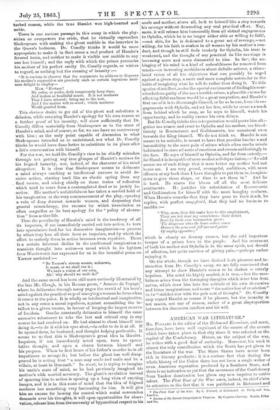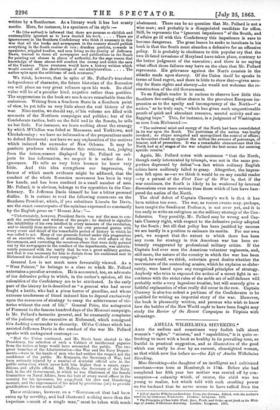AMERICAN WAR. LITERATURE.*
Ma. POLLARD is the editor of the Richmond Examiner, and must,. therefore, have been well cognizant of the course of the events- which have taken place in that city since it was selected as tho capital of the Confederacy. Hence, on the subject of the war, he writes with a good deal of authority. Moreover, his work is almost the only contribution which the South has yet given ta the literature of the war. The Slave States have never been rich in literary products; it is a curious fact that during the whole history of the Union there has not been a single writer of even American reputation produced by a Southern State, and there is no indication as yet that the severance of the Confederacy from Yankee domination has given any new impetus to native talent. The First Year of the War owes, indeed, its chief claim to attention to the fact that it was published in Richmond and
• The First Year of Me War. By E. Pollard, of Richmond. C. Philip and Son. London.
• Bevies; of the Rearti Campaigns in Virginia. By Captain Chesney. Smith, Eldaa and Co.
written by a Southerner. As a literary work it has but scanty merits. Here, for instance, is a specimen of its style :—
"He (the author) is informed that there are persons so childish and
contemptibly ignorant as to have decried his work There are ignoramuses in the Southern Confederacy who think it necessary in this war that all the books and newspapers in the country should publish everything in the South cooker de rose ; drunken patriots, cowards in epaulettes, crippled toadies, and men living on the charity of Jefferson Davis, trained to damn all newspapers and publications in the South for pointing out abuses in places of authority, for the sage reason that knowledge of these abuses will comfort the enemy and tickle the ears of the Yankees. These creatures would have a history written which would conceal all the shortcomings of our administration. . . . . The author spite upon the criticisms of each creatures."
We think, however, that in spite of Mr. Pollard's truculent independence of character, the future historian of the Secession era will place no very great reliance upon his work. Its chief value will be of a peculiar kind, negative rather than positive. The suppressions in the book are much more remarkable than the omissions. Writing from a Southern State in a Southern point of view, be yet tells us very little about the real history of the war. Nine-tenths, we should say, of his volume are filled with accounts of the Northern campaigns and politics ; but of the Confederate tactics, both on the field and in the Senate, he tells us but little. For instance, we learn nothing about the strategy by which M'Clellan was foiled at Manassas, and Yorktown, and Chickahominy ; we have no information of the preparations made to defend Richmond; nor have we any explanation of the motives which induced the surrender of New Orleans. It may be patriotic prudence which dictates this reticence, but, judging from the intemperance displayed by Mr. Pollard on sub- jects he has information, we suspect it is rather due to ignorance. He tells us very little because he knew very little. And this idea strengthens our impression, in favour of which much evidence might be adduced, that the conduct of the whole Secession movement has been in very few hands, and has been confined to a small number of men. Mr. Pollard, it is obvious, belongs to the opposition in the Con- federacy. To Jefferson Davis himself he has a bitter personal dislike. It is curious to read the following comments on the Southern President, which, if you substitute Lincoln for Davis, are the exact counterparts of the opinions expressed so constantly by the English press on "Honest Abe : "— "Unfortunately, however, President Davis was not the man to con- sult the sentiment and wisdom of the people ; he desired to signalize the infallibility of his own intellect in every measure of the revolution, and to identify from motives of vanity his own personal genius with every event and detail of the remarkable period of history in which he was called to act. Many of our generals fretted under this pragmatism of an executive who, instead of attending to the civil affairs of the Government, and correcting the monstrous abuses that were daily pointed out by the newspapers in the conduct of the departments, was unfortu- nately possessed with the vanity that he was a great military genius, and that it was necessary for him to dictate from his cushioned seat in Richmond the details of every campaign."
General Lee is not much more favourably viewed. As a "West Pointer," he belongs to a class to which Mr. Pollard entertains a peculiar aversion. He is accounted, too, an advocate of the defensive policy to which, in the author's opinion, all the calamities of the Confederacy are to be attributed. In the early part of the history he is described as "a general who had never fought a battle, who had a pious horror of guerillas, and whose extreme tenderness of blood induced him to depend exclusively upon the resources of strategy to essay the achievement of vic- tories without the cost of life." General Price, the antagonist of Fremont in the famous hundred days of the Missouri campaign, is Mr. Pollard's favourite general, and he constantly complains of the jealousy of the executive at Richmond, which consigned this dashing commander to obscurity. Of the Cabinet which has assisted Jefferson Davis in the conduct of the war Mr. Pollard speaks with undisguised contempt :—
"Had the Union continued, and Mr. Davis been elected to the Presidency, the selection of each a Cabinet of intellectual pigmies from the nation at largo would have astounded the public. The two great branches of the Administration—the War and the Navy Depart- ments—were in the hands of men who had neither the respect nor the confidence of the public. Mr. Benjamin, the Secretary of War, had been seriously injured by a number of doubtful official acts in the public estinrition, which never held him higher than a smart, expe- ditions, and affable official. Mr. Mallory, the Secretary of the Navy, had, in the old Government, in which he was Chairman of the Senate Committee on Naval Affairs, been the butt of every naval officer in the country for his ignorance, his sang-froid, his slow and blundering manner, and the engrossment of his mind by provisions (sic) to provide gratifications for his social habit."
These criticisms, however, on a " Gorernmsnt that had bean eaten up by servility, and had illustrated nothing more than the imperious conceit of a single man," must be taken with much
abatement. There can be no question that Mr. Pollard is not a wise man ; and probably is a disappointed candidate for office. Still, he represents the "ignorant impatience" of the South, and if affairs go ill with this Confederacy this impatience is sure to become dangerous. The great lesson be seeks to inculcate in his book is that the South must abandon a defensive for an offensive policy. It is probably in obedience to this popular cry that the two ill-fated invasions of Maryland have taken place, contrary to the better judgment of the executive ; and there is no saying what effect these failures may have on the class that Mr. Pollard represents. His grievance against the North consists in the attacks made upon slavery. Of the Union itself he speaks in terms of fond regret, and there is little to show that—given secu- rity for State rights and slavery—he would not welcome the re- construction of the old Government.
To an English reader it is curious to observe how little this Southern fire-eating editor shares in the prevalent European im- pression as to the apathy and incompetency of the North—" a nation," as he truly says, "which has given such unquestionable proofs of quick and abundant resource, mental activity and un- flagging hope." This, for instance, is a judgment of Washington as seen from Richmond :—
6' The universal mind and energy of the North had been consolidated in its war upon the South. The patriotism of the nation was loudly invoked ; no clique arrogated and monopolized the control of affairs; no favourites closed up against the million the avenues of patronage, of honour, and of promotion. It was a remarkable circumstance that the North had at all stages of the war adopted the best means for securing specific results."
Again, Mr. Pollard notes with acuteness "that the North, though easily intoxicated by triumph, was not in the same pro- portion depressed by defeat"—a fact which ordinary English elides have uniformly failed to grasp. Altogether, the impres- sion left upon us—as we think it would be on any candid reader —by a perusal of the First Year of the War is, that if the war continues, the South is likely to be weakened by internal dissensions even more serious than those which of late have ham- pered the nation of the North.
The chief defect of Captain Chesney's work is that it has been written too soon. The war, as recent events may, perhaps, have taught the Sandhurst Professor, is not over yet, and it is too early to write an eulogium on the military strategy of the Con- federates. Very possibly, Mr. Pollard may be wrong and Cap- tain Chesney right, with respect to the defensive policy adopted by the South ; but till that policy has been justified by success we are hardly in a position to estimate its merits. For our own part, we suspect that the extent to which there has been any room for strategy in this American war has been ex- tremely exaggerated by professional military critics. If the Captain had ever seen the American volunteer regiments, and, still more, the nature of the country in which the war has been waged, he would, we think, entertain great doubts whether the movements of the contending armies, which he explains so elabo- rately, were based upon any recognized principles of strategy. Anybody who tries to expouud the action of a street fight in ac- cordance with the strict rules of the noble art of self-defence will probably write a very ingenious treatise, but will scarcely give a faithful explanation of what really did occur in the row. Captain Chesney is also too ardent a partizan of the Confederates to be qualified for writing an impartial story of the war. However, the book is pleasantly written, and persons who wish to know how the battles of the New World ought to have been fought may study the Review of the Recent Campaigns in Virginia with advantage.































 Previous page
Previous page